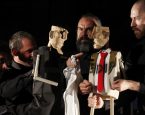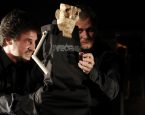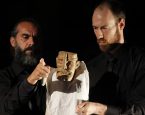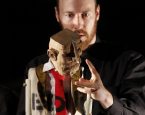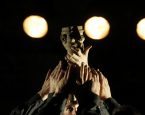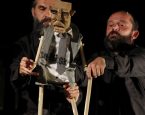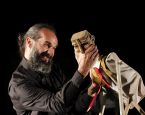Luciano Delprato, born in Cordoba, Argentina, is the director of the acting and puppet show for young people and adults, “Oedipus the King”, according to his own adaptation of Sophocles’s play. The eagerly-awaited performance was created in collaboration with the Croatian National Theatre Ivan pl. Zajc and the Rijeka City Puppet Theatre. The show will premiere on Friday, July 3 in the Exportdrvo space, with a reprise on July 4. The characters of “Oedipus the King” are portrayed by puppets and masks, which are brought to life by actors Edi Ćelić, Dean Krivačić, Mario Jovev, Alex Đaković and Nikola Nedić.
You frequently travel for work, flying from one Argentinian city to another, to the theatres in which you prepare your plays or to the universities where you teach. Is that why Rijeka is a small town for you?
I don’t see Rijeka as a small town. Rijeka is just a different size. It feels like an important port, and it has a rich past. It’s bigger than it acts.
In 2015, you collaborated on the play “#radninaslovantigona” (“#workingtitleantigone”) at the Zagreb Youth Theater in Croatia as a set and puppet designer with director Renata Carola Gatica. You love to present Greek tragedies in a new way; your interpretation of “Oedipus the King” is modern and close to today’s generations.
Greek classics are of special interest to me because Western civilization is based on them. However, I do not see these works as an image of the past, but as an image of the present. I check to see if the classics are truly classics or if they have become something dead. That’s my first goal. A classic is a book you never finish reading.
You adapted Sophocles; the play addresses young people and adults closely.
I created the adaptation thinking about the topical relevance, with one foot in Sophocles’s work and the other in the present moment. It was not my intention to “cosmetically” dress the work in a new suit. I didn’t paint over an old wall with fresh paint or create a new window to look back at the past. I would say it is an old window overlooking the present. Sophocles is actually incredibly modern, and through retrospection chooses to depict the event as a crime drama. At the same time, we are telling a story about the secret of identity. How what we are is 99% a mystery. Out of our control. We are defined by the DNA of our parents.
I adapted the drama, and by removing all the gods, it became monotheistic to better reflect Christian society. The characters in the play confuse the state, God and the market. They are all the superheroes of today. Economists are worried that the coronavirus pandemic will wipe out humanity because it’s bad for the market…
Does Oedipus really want to know or is he afraid of knowing?
Oedipus is determined to find out the truth until the end. Precisely that desire to know the truth is what makes this work one-hundred percent a tragedy. He doesn’t give up for a moment or take a step back. Jocasta understands everything before Oedipus. She advises and warns him. But Oedipus wants to know! He gains success, money and power thanks to solving a sphinx puzzle. He thinks of himself as Sherlock Holmes. But he isn’t. We see this even now during the pandemic. Is it under anyone’s control? You have to be wiser and know that everything is connected and that no one controls anything. You can only find out who you are through interactions, through contact with others, with animals, with nature. Sometimes it’s harmonious, and sometimes it’s a struggle.
What do you particularly emphasize in your “Oedipus the King?”
The play is about the mystery of identity.
Look, nationalism and racism are flourishing today. Some are too convinced of what they think they are, that they’re somehow more valuable than others. If they were more in touch with the mystery of identity and aware of the fragility of what they call themselves, that things are not under their control, they would realize that humility is important and that we need each other. The only thing we can do, the only way that we can find out who we are, is to ask other people. Some people think they own the world. That could be clearly seen during this corona crisis. It turns out that those who act as if they control everything actually aren’t controlling anything.
The puppets in “Oedipus the King” aren’t for children in this play but rather for young people and adults.
I have already heard a lot of prejudices: “Ugh, they’re making Oedipus with puppets. They’re completely out of ideas,” “Using puppets means it’s a play for children,” and similar. Some point fingers and think they know best. It’s the same mistake that Oedipus keeps repeating. He thinks he KNOWS. But he doesn’t even know who he is!
The puppets are the kings – they rule. The puppeteers are the servants. That is the way we bring contradiction and metaphor; we treat the people who make our movement possible as servants.
Actors of Croatian Drama and the City Puppet Theatre.
I am completely in love with actors. That’s why I’m a director.
What the actors have to do is very complex and challenging. The concept that one actor is one character is excluded – they’re a team. Every one of them will shine as much as the whole team does.
They are on stage the entire time. It’s all up to them. They’re very exposed. The audience can see everything—really everything—even the puppets waiting for the actors to bring them to life. We are not hiding anything. It’s like a clock in which you can see the whole mechanism.
It’s tragic, but witty.
We completely misunderstand tragedies. Sophocles’s approach to the tragedy in “Oedipus the King” is sarcastic, ironic. I didn’t come up with that. We learned from Shakespeare that the tragedy that hurts us the most should be able to be laughed at the most. “Comedy is tragedy plus time,” as Woody Allen says.
As with the ancient Greeks, there are no women in your play.
It’s important to show the absence of women, which is still widespread in society today. In ancient Greece, this was not noticeable. But now it is important to show it, to remind people of it. It is a modern picture of the political world. There is only one female character in the work. I have kept the tradition that only men act, that we have a chorus, that there are no women, no sex scenes, no murder scenes… there are many rules from the Greek tragedies that we followed. I didn’t want to make an adaptation like some crazy artist who does what he wants with a classic. There are many rules that I paid close attention to.
The play features actors in black suits. The first association is that they are politicians.
Yes… the puppet actors, puppeteers and actors are also bodyguards and council members and advisors…
Politicians think they are superior, and we expect them to be omnipotent, as if they are not just people themselves. We blame the politicians we elected ourselves. If we grow as a society, we’ll have better leaders as well. Trump is a tragedy of Western society. Of American society. Is that just his problem? No. It’s everyone’s problem. It’s time for us to wake up. All the idiocy, all the self-confidence, it’s all telling of us. Trump is first and foremost a mirror of society. That is a tragedy and it’s far more heartbreaking than “Oedipus the King.” “Oedipus the King” talks about our relationship with leaders.
On the subject of prejudice… to conclude, for those who think Sophocles is too complicated:
It’s simple in the sense that it is direct, but it’s ambitious and complex. I think it’s worth coming to see. The actors can hardly wait for your arrival!
Interviewed by Andrea Labik



